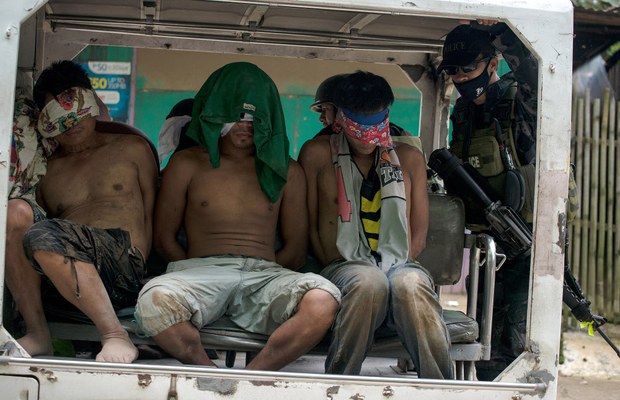Marawi Battle Brings New Risks for Southeast Asia, Think-Tank Warns
2017.07.21
Washington
 Suspected Islamic State-linked militants are transported in a police vehicle after being captured in a village in Marawi City, June 3, 2017.
Suspected Islamic State-linked militants are transported in a police vehicle after being captured in a village in Marawi City, June 3, 2017.
Updated at 1:46 p.m. ET on 2017-07-21
Southeast Asian countries could face larger terrorist threats after Philippine forces finally wrest the Mindanao city of Marawi from an alliance of Islamic State-linked militants, a Jakarta-based think-tank warned in a report published Friday.
The militants’ ability to hold onto portions of Marawi and ward off a government onslaught over the past two months will have regional ramifications “long after the Philippines military retakes the city,” the Institute for Policy Analysis of Conflict (IPAC) reported.
“The risks won’t end when the military declares victory,” IPAC director Sidney Jones said in releasing the report. “Indonesia and Malaysia will face new threats in the form of returning fighters from Mindanao, and the Philippines will have a host of smaller dispersed cells with the capacity for both violence and indoctrination.”
The post-Marawi after-effects could bring about a higher risk of violent attacks in cities in the Philippines as well as in Indonesia and Malaysia, IPAC said. There could also be greater cooperation among Southeast Asian extremists and new leaders emerging in pro-Islamic State (IS) cells in Indonesia and Malaysia from among combat veterans returning from Marawi, the report said.
IS-backed operations in the southern Philippine city “received direct funding” from IS central in the Middle East, revealing “a chain of command that runs from Syria through the Philippines and beyond,” according to the 25-page study, titled “Marawi, the ‘East Asia Wilayah’ and Indonesia.”
The report compares photographs posted on social media after the battle in Marawi began on May 23, showing smiling fighters holding their weapons in the air, with victory photos from Mosul, Iraq, in 2014.
“They generated a shared sense of triumph and strengthened the desire of ISIS supporters in the region to join the battle,” IPAC said among the conclusions in its report, referring to IS by another acronym.
Major roles for foreign fighters
IPAC also examined the role of foreigners linked to IS in preparation for the battle. The report specifically identifies Malaysian professor Mahmud bin Ahmad as an example of a foreigner who had a crucial role in aiding the Marawi militants.
Not only did those foreigners wanting to join the battle have to go through him to get to the southern Philippine island of Mindanao, he also was responsible for thousands of dollars channeled through IS to purchase weapons, the report said.
The report detailed how, in January 2017, Mahmud set up a delivery of U.S. $10,000 through a Telegram account. The money was sent by Western Union to trusted recipients in the Philippines. In February and March, Mahmud set up similar transfers of $25,000 and $20,000 from sources in Syria to recipients in the Philippines.
Mahmud was in Marawi during the battles but, according to a Malaysian counter-terrorist police official, he may have fled to Indonesian or Malaysian Borneo from the Philippine city after reports emerged last month that he was possibly killed in the fighting there.
“We believe Mahmud is not in Marawi now as he is more of a planner and administrator,” an intelligence official based in the nearby Malaysian state of Sabah told BenarNews on Friday.
“In the early days of the fighting, he was there in Marawi. But now, he and Isnilon have fled, and Mahmud is believed to be with the IS in Basilan,” the source said on condition of anonymity.
He was referring to Isnilon Hapilon, a top leader of the southern Philippine militant group Abu Sayyaf who is recognized as the leader of the Philippine branch of IS.
Indonesian fighters
Based on estimates that 20 Indonesians joined other foreign fighters in Marawi, IPAC listed potential concerns for the government.
These include “the return of a few men with the potential to organize, unite and lead some of the existing pro-ISIS cells”; interest shown among militants in the Philippines, Malaysia and Indonesia in pursuing joint operations in Indonesia; and Indonesians possibly becoming involved in violent acts in the two neighboring countries.
The report also mentions the potential risk of militants establishing “a new regional training site in Mindanao that could attract recruits from Indonesia and Malaysia and even further afield.”
Indonesian police are watching out for home-grown militants returning from the fighting in Marawi, a spokesman for the national police force said in response to the IPAC report.
“We are cooperating with immigration officials to flag those suspected as returnees from Marawi. We will keep an eye on them, although, legally, there is nothing we can do,” Police spokesman Inspector General Setyo Wasisto told BenarNews on Friday.
The police force has also increased its presence in North Sulawesi province and other island areas in Indonesia’s northernmost reaches closer to the southern Philippines, so as to prevent militants in Marawi from infiltrating Indonesian territory by sea, Setyo added.
Dysfunctional ties
Among the conclusions in its new report, IPAC makes the case that Indonesia, Malaysia and the Philippines – the three “front-line” nations in this battle against IS – need to recognize where they have problems and focus on greater cooperation, while fixing dysfunctionality in their bilateral and multilateral security relationships.
“These include the deep-seated political distrust between the Philippines and Malaysia that impedes information sharing; concern from Indonesia and Malaysia police about mixed loyalties of local counterparts in Mindanao, especially given clan and family links; and institutional disjunctures that give the lead in counter-terrorism to the police in Indonesia and Malaysia but to the military in the Philippines,” the report said.
Ismira Lutfia Tisnadibrata in Jakarta, Felipe Villamor in Manila, and Colin Forsythe, in Kota Kinabalu, Malaysia contributed to this report.







